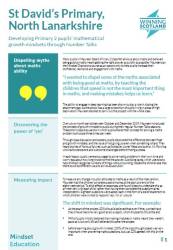
Developing mathematical growth mindsets through Number Talks
Pupils in Maureen Steel's Primary 2 class at St David's Primary School in North Lanarkshire felt anxious about maths. Maureen saw Winning Scotland's Mindset Champions course as an opportunity to help pupils increase their confidence, resilience and engagement with maths.
Many pupils in Maureen’s class believed being good at maths meant getting the right answer as quickly as possible.
Over a two-month period between October and December 2019, Maureen introduced the concept of growth mindset to pupils during their regular Number Talks sessions.
These short class discussions in which pupils shared their process for solving a maths problem took place three times per week. Through class discussion and posters, pupils discovered the difference between fixed and growth mindsets, and the value of not giving up even when something is hard.
They heard stories of ‘famous failures’ such as footballer Lionel Messi and author J.K. Rowling, who had to persevere and overcome challenges before finding success.
In each lesson, pupils were encouraged to solve maths problems in their own time and worry less about how long it took to find the answer. Subitising cards, which use dots to help children recognise numbers of things without counting, helped the children see that there could be different ways to arrive at a solution.
You can view or download the full case study below (5 minute read).
Over a two-month period between October and December 2019, Maureen introduced the concept of growth mindset to pupils during their regular Number Talks sessions.
These short class discussions in which pupils shared their process for solving a maths problem took place three times per week. Through class discussion and posters, pupils discovered the difference between fixed and growth mindsets, and the value of not giving up even when something is hard.
They heard stories of ‘famous failures’ such as footballer Lionel Messi and author J.K. Rowling, who had to persevere and overcome challenges before finding success.
In each lesson, pupils were encouraged to solve maths problems in their own time and worry less about how long it took to find the answer. Subitising cards, which use dots to help children recognise numbers of things without counting, helped the children see that there could be different ways to arrive at a solution.
You can view or download the full case study below (5 minute read).
St David's PS case study





